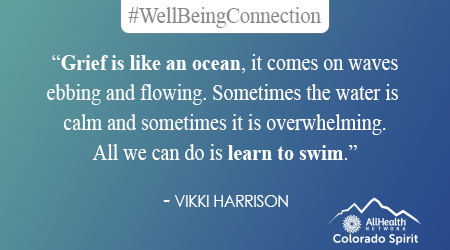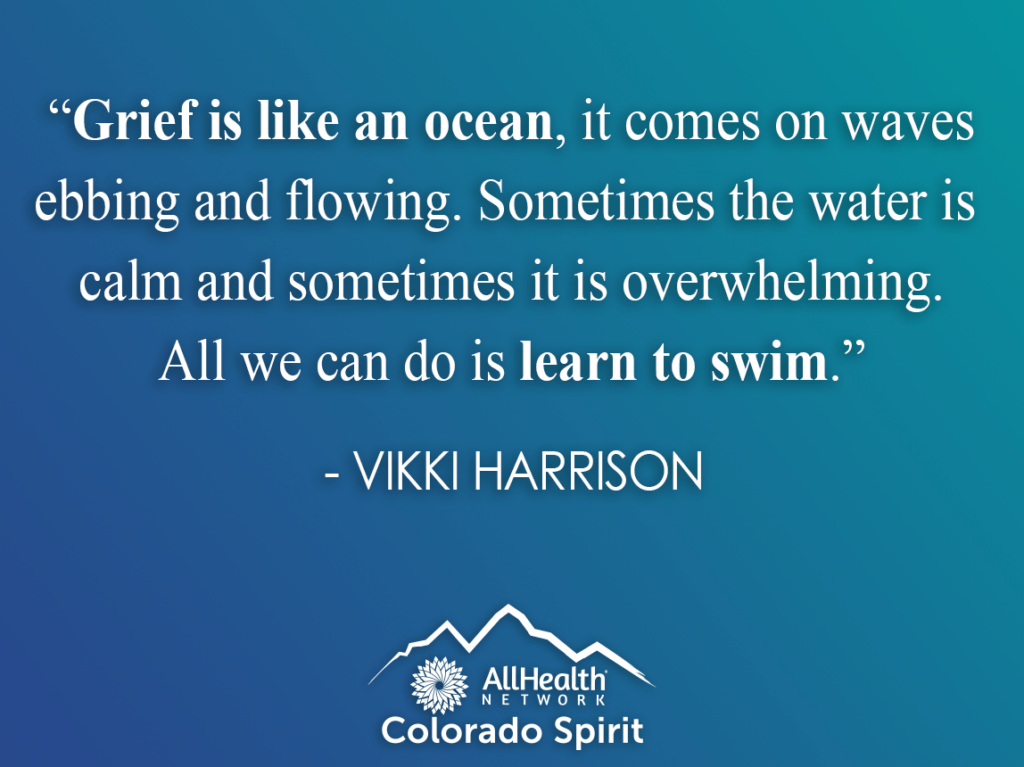Welcome to the Weekly Well-Being Connection! Each week we will share advice from our clinical experts on ways to care for your mental health and well-being throughout COVID-19.
Throughout my time in the helping profession, I have talked with a lot of people about grief and loss. I have learned that people are often surprised when I bring up the topic though. Most of us relate the feeling of grief only to the death of a loved one, but fewer of us think about grief and loss as an understandable reaction to when our sense of what is “typical” shifts.
Grief Can Be Seen In Many Places
During the pandemic, grief can be seen in many places, but we are not always talking openly about this. The loss of life due to COVID and the subsequent challenges being in community with others around this grief is incredibly painful. At the same time, people who have recovered from the illness but are still struggling with the health consequences are experiencing grief. There is also grief and loss related to job loss, housing challenges, not being able to celebrate milestones and rituals with friends and family, changes or cancelations of events and celebrations, not being able to come together in community like we are used to, and even the shift away from seeing multiple people, in person, each day.
This Harvard Business Review article highlights varieties of grief during the pandemic and speaks with grief specialist, David Kessler, about some ways to manage these feelings.
Try Out a Few Of These Tips
Grief is an intense and powerful experience. For many of us, it comes in waves. There is not a “fix” for grief, but there are things that can help us tolerate the intensity. We encourage you to try out a few of these tips.
- Allow yourself to feel the feelings – All emotions, even the intense and uncomfortable ones, are communications. This is particularly true of grief. We feel grief because we have lost someone or something important to us. It makes perfect sense that we feel sadness and helpless with grief. Allowing ourselves space to experience and acknowledge this is an important part of grieving.
- Learn about the stages of grief – Elisabeth Kubler Ross and David Kessler identify that denial, anger, bargaining, depression, and acceptance are all a part of the natural grief reaction. Not all of us will experience each stage and we do not experience the stages in any particular
 order, but they can help us frame and normalize our experience. This model can also help us understand why our grief can feel so different from moment to moment. Daniel Scott shares in this piece how these stages, and a 6th stage of finding meaning, might show up during the pandemic. While Daniel Scott speaks from the perspective of an educator, so many of the themes he speaks to are ones many of us can recognize in our lives right now.
order, but they can help us frame and normalize our experience. This model can also help us understand why our grief can feel so different from moment to moment. Daniel Scott shares in this piece how these stages, and a 6th stage of finding meaning, might show up during the pandemic. While Daniel Scott speaks from the perspective of an educator, so many of the themes he speaks to are ones many of us can recognize in our lives right now. - Know what to do when if you get into a space of judging our feelings or reactions – Finding ways to engage in soothing and calming practices and ways to bring your attention back to the present moment can help us step out of this place of judgment or feeling of being stuck. Techniques like the 54321 grounding practice or other exercises outlined here can help us ground to our present moment and space.
- Movement helps! – Just like movement helps us move through our stress response, movement and physical activity can help us move through our emotions. In a recent podcast, David Kessler recommended GriefYoga.com as a source for different practices to help us physically move through our grief. There is a free 20-minute chair class available here .
- Find ways to connect with others – Grief can be isolating, and making an intentional choice to be in community with others and share experiences with grief can be incredibly impactful. While we might need to think of different ways to be in community with others, we know skipping this step can prolong and complicate grief.
Would speaking to someone help?
To speak with someone in the Colorado Spirit Program about stress related to the pandemic, please call 720-707-6789 or visit our web page at www.allhealthnetwork.org/Colorado-Spirit
For information about other services at AllHealth Network or to get connected with ongoing behavioral health support, please call: 303-730-8858.
AllHealth Network is continuing to provide service via telehealth or by phone and our Crisis Walk-in Center remains open 24/7. To learn more about what other community mental health centers are doing, please visit The Colorado Behavioral Health Council COVID-19 website.
If you are experiencing a mental health crisis and are in need of immediate assistance, please call the Colorado Crisis Hotline at 1-844-493-TALK (8255) or text TALK to 38255

